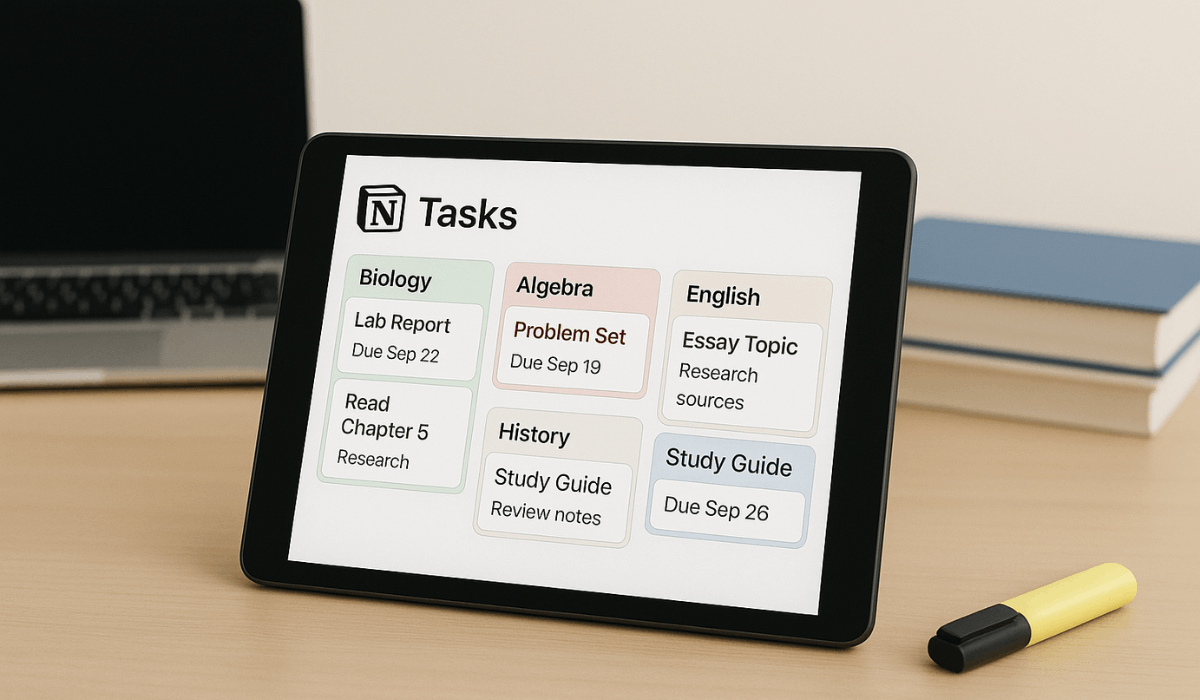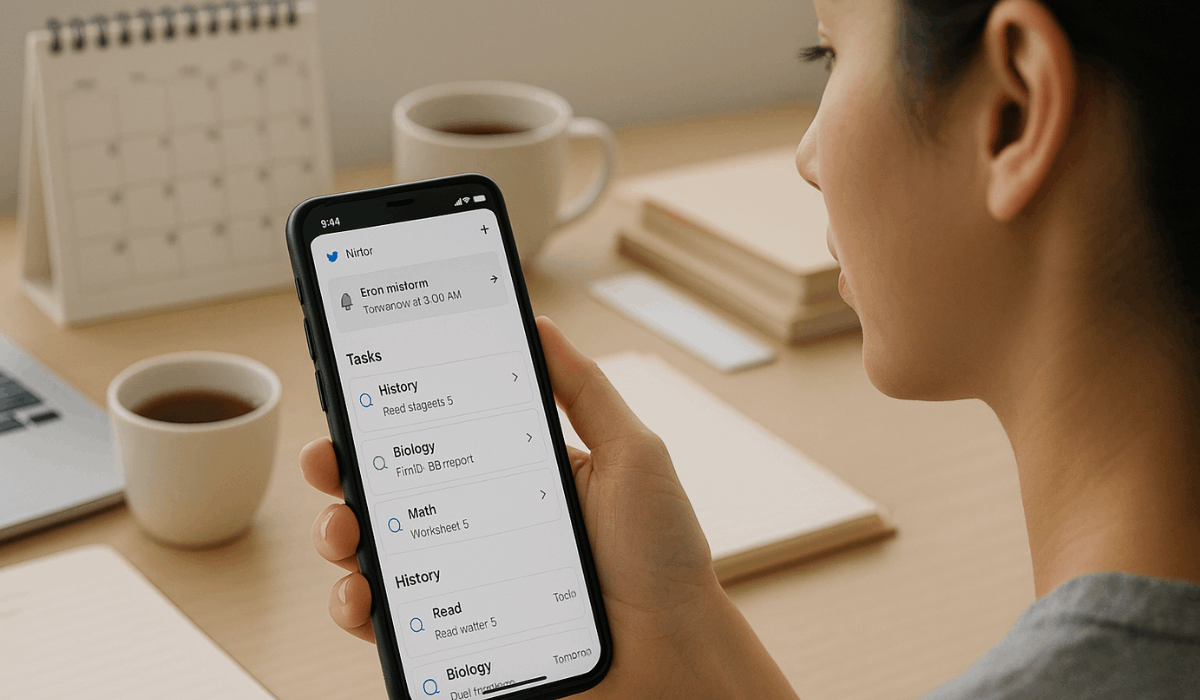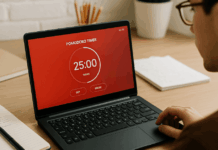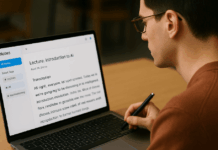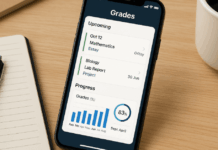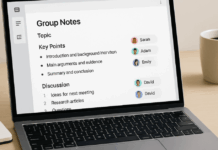Staying on top of assignments, exams, and study schedules can be overwhelming.
Task management apps help you organize everything in one place, allowing you to focus on what matters.
This guide demonstrates how to utilize these tools effectively to enhance your academic performance and alleviate stress.
What Are Task Management Apps?
Task management apps are digital tools that help you track, organize, and schedule your academic tasks.
They’re especially useful for students managing multiple subjects, assignments, and tight deadlines.
Top Task Management Apps for Students
Here are some of the best task management apps that help students stay organized and on schedule:
- Todoist – Clean interface with labels, priorities, and recurring tasks. Great for both complex and straightforward planning.
- Notion – Combines task lists, notes, calendars, and databases in one customizable workspace.
- Trello – Uses visual boards and cards, perfect for tracking progress on projects and group assignments.
- MyStudyLife – Designed for students, lets you manage classes, assignments, and exams in one place.
- Microsoft To Do – A simple task list app that syncs with Microsoft 365 tools like Outlook and OneNote.
- Google Tasks – Basic and user-friendly, integrates well with Gmail and Google Calendar for deadline reminders.
Benefits of Using Task Management Apps for School
Using a task management app can enhance your study, planning, and deadline management.
Here are the key benefits students gain from using these tools:
- Keeps everything in one place – You can manage assignments, projects, and exams without losing track of them.
- Improves time management – Helps you break tasks into manageable parts and stick to a daily schedule.
- Reduces stress – With reminders and organized lists, you feel more in control and less overwhelmed.
- Boosts productivity – By clearly identifying what needs to be done, you can focus more effectively and complete tasks more efficiently.
- Supports academic goals – Staying organized leads to fewer missed deadlines and better grades.
- Customizes to your style – Most apps let you use tags, colors, and layouts that fit your work style best.
How to Use a Task Management Tool Effectively
Just downloading an app isn’t enough—you need to use it correctly.
Follow these steps to get the most out of your task manager:
- Choose the right app – Select one that suits your study habits and syncs across all your devices.
- Create subject-based lists or boards – Organize tasks by class, topic, or assignment type.
- Add tasks with clear titles and deadlines – Include due dates, reminders, and details so nothing gets missed.
- Prioritize tasks daily – Focus on what’s urgent or essential using labels or stars.
- Check and update it every day – Build the habit of reviewing tasks each morning or evening.
- Use notifications wisely – Set alerts for key tasks without overwhelming yourself with pop-ups.
Using Task Platforms for Group Projects
Task management tools aren’t just for solo work—they’re also great for keeping group projects on track.
Here’s how you can use them effectively in team settings:
- Assign tasks to team members – Use apps like Trello or Notion to delegate specific responsibilities.
- Set shared deadlines – Create common due dates so everyone stays aligned on progress.
- Use comments or notes for updates – Keep communication inside the app to avoid losing details.
- Track task status – Monitor who’s doing what and what’s completed using labels or checklists.
- Share files in one place – Upload resources directly to the app for quick access by all members.
- Sync with calendar tools – Ensure that meetings and deadlines are visible to everyone involved.
Integrating with School Systems and Calendars
Linking your task management tool with school platforms and calendars helps you stay fully organized. Here’s how integration can improve your workflow:
- Sync with Google Calendar or Outlook – Automatically pull in class schedules, exams, and school events.
- Connect with learning platforms like Canvas or Microsoft Teams – Track assignments and updates in real-time.
- Use app integrations for notifications – Get reminders through email or calendar alerts.
- Centralize your schedule – View all academic and personal tasks in one calendar view.
- Avoid double-booking – Quickly identify overlapping tasks and deadlines with complete visibility.
- Access everything across devices – Keep your calendar and tasks synced on mobile, tablet, and desktop.
Tracking Study Time and Productivity
Tracking how you spend your study hours can help you manage time better and focus on what matters most.
Many task apps include built-in tools or integrate with time trackers—here’s how to use them:
- Use Pomodoro or timer features – Break study time into focused sessions with short breaks in between.
- Log hours spent per subject – See which topics take up most of your time and adjust as needed.
- Review weekly activity – Look at time logs to identify patterns or distractions.
- Set productivity goals – Aim for a certain number of study hours or completed tasks each week.
- Use labels or tags to track types of tasks – Distinguish between reading, writing, and review work.
- Reflect on efficiency – Compare planned time vs. actual time to improve future planning.
Tips for Sticking With It
Starting is easy, but staying consistent with a task management app takes effort. These tips will help you build the habit and keep using it effectively:
- Set a daily check-in time – Review and update your tasks at the same time each day.
- Start with a simple setup – Don’t overload your app with too many categories or details at first.
- Keep your task list realistic – Add only what you can complete each day.
- Use colors or tags to stay organized – Visual markers make it easier to spot essential items.
- Limit the number of active apps – Stick to one main task manager to avoid confusion.
- Track your progress weekly – Reflect on what worked and what needs adjusting.
Common Mistakes to Avoid
Using a task management app can backfire if it’s not used correctly. Watch out for these common mistakes that can limit your productivity:
- Not checking the app daily – Skipping daily reviews makes it easy to miss deadlines.
- Overloading the task list – Too many tasks at once can feel overwhelming and reduce focus.
- Ignoring due dates or priorities – Without setting deadlines, tasks lose urgency and pile up.
- Switching between too many apps – Using multiple tools can cause confusion and disorganization.
- Failing to update completed tasks – Leaving finished tasks unchecked clutters your workflow.
- Skipping setup time – Not organizing your app properly from the start leads to chaos later.
The Bottomline
Task management apps help you stay organized, meet deadlines, and reduce academic stress.
By using them consistently and avoiding common mistakes, you’ll see tangible improvements in your school performance.
Start with one app today and build a simple routine that works for you.

